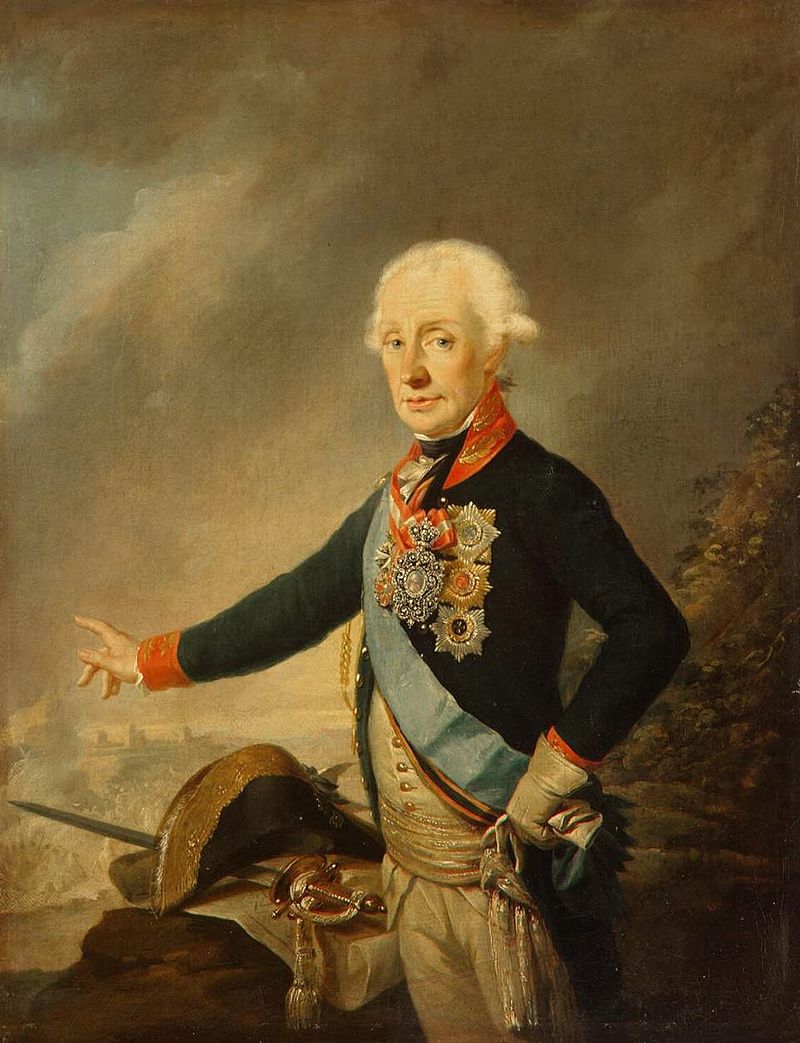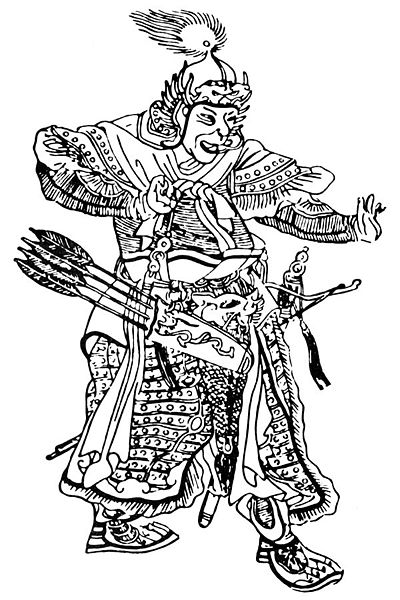Many generals and army-leading princes are standing tall in military history, but which one was the greatest of all?
I have two suspects, with a clear favourite for #1.
Many of the usual suspects such as Caesar, Hannibal, Frederick the Great, Prince Eugen, Alexander the Great, Napoleon don't make it to that very short list.
Some of them simply inherited a powerful war machine (Caesar, Frederick, Alexander in some regards Napoleon) and were the first ones to fully unleash it. Some illustrious names from WW2 fit that bill as well.
Severe shortcomings disqualify some such candidates (Frederick relied on the frontal oblique order infantry push tactic for too long, Hannibal failed in regard to sieges, and I am thoroughly unimpressed by Prince Eugen's tactics at Belgrade in 1717).
My two suspects are:
 #2 Suvorov
#2 Suvorov
He was the best general the czars ever had. He was a master of superior speed on the operational level (arriving ready for battle before expected) and on the tactical level. His tactics varied, but tended to avoid lengthy exchanges of fires. Suvorov also did much for the improvement of training.
His spell of 63 victories in battle without a defeat qualifies him for the very short list of suspects.
#1 Subutai
This Mongol general can claim to have fought the most varied opposition, most varied terrains, most enemies by quantity, the quickest-moving campaigns (even shaming Suvorov), caused the most devastation - and he routinely won, even with stark numerical inferiority. He wasn't born into nobility or even only into Genghis Khan's tribe. His incredible talent was spotted and he made an incredible career despite his suboptimal upbringing.
There's no point in even only trying to assess him on a moral level (from a Christian perspective he no doubt burns in hell), but as a leader of armies he is a strong contender for the #1 spot.
His many operational art innovations (including predating Napoleon by centuries on the coordination of multiple armies), varied tactics and decades of practically uninterrupted campaigning and battlefield successes (65 victories in battle, afaik without defeat) stand out in military history.*
I encourage you to read more about them, and to interpret that info in the context of their technology, society and political environment.
S O
defence_and_freedom@gmx.de
.
*: One could claim that Subutai inherited a superior military machine as well, but his forces were very similar to important opposing forces (such as the Cumans). They were also a lot less impressive after his death and weren't very different from the steppe armies that the Central Asian and East European steppes had produced for 1,500+ years before him. The Mongol bow was a bit better but otherwise Mongols weren't very dissimilar in forces quality to the steppe-dwelling Skythians from the time of Alexander the Great.


I think you have chosen two very interesting generals.
ReplyDeleteAnyway I think is much more important for a country to identify and sack incapable generals that looking for geniuses.
An incapable general can lose or even win a Pyrrhic victory in the best of odds.
A competent or even average general will regularly win with favorable odds an lose with desfavorable ones. It is politicians and strategic command task to provide those favorable odds by looking for allies, by declaring war early if those odds will worsen in the future and so on.
In addition to that, it is much more probable to have many more bad generals that one genius.
JM
This comment has been removed by the author.
ReplyDeleteI'm surprised that you are falling to this english speaking forums ''who was the best etc...'' thing (normally an excuse to put 6 or 7 items or people in the list from english speaking countries) at least the mongols are recognized...
ReplyDeleteThere, a list based on statistics and maths based on a baseball quality data program (yeah) or so they say: https://www.wearethemighty.com/history/best-generals-ranked-by-statistics
I still don't like it (it's easy to say that Suvorov was always a winner but againts the decadent Ottoman Empire and the ever shrinking Poland in many times...when faced by the revolutionary french army his idea of storming Paris ended when the other russian-allies army was defeated and he had to retreat to russia...yes undefeated but still Revolutionary France was too.) There is to many variables (how do you compare Alexander the Great to a modern general?) and the quality of the opposition should be one of them as the cost of victories. Personally I would put Gengis Khan or Hannibal. They came from very little and their ennemies were formidable. Napoleon is very close.
Maybe I was too subtle. This wasn't a "top 10" list or anything similar. It was a pointer towards historical figures who in turn can be a pointer at what drives success.
DeleteSuvorov's style was very much at odds with Frederick's lessons learned from the Seven Years War, for example.
You don't seem to have paid much attention to what I wrote here anyway. Genghis Khan was no superb general. He had Subutai for this line of work. Genghis Khan was rather the uniting politician.
Genghis Khan was not only a superb general for himself, he moreover had other military genies than only subutai. For example Dschebe Noyon who was paired with Subutai most times until his death was regarded as even the better general in comparison in his lifetime (subutai lifed much longer and become better then with growing age). There are many other excellent mongol generals too on the same level.
DeleteThis point: to develope the right warriors and to bring them up in high military ranks was one of the main things of the genius of Genghis Khan. He had an eye for good people and promoted them to the top ranks regardless there they come from. He even recruited them from the enemy. For example Dschebe was at the beginning of his astonishing military career an enemy soldier who nearly killed Genghis Khan with an arrow, therefore the name.
This talent to find the best and brightest, to promote them regardless of rank, ancestry, wealt and influence of their families, and even to convince former enemies to join his side and to become his most fanatical followers is one the greatest military performances of the Great Khan.
He developed also a kind of officer school and training unit for high ranking troop leaders withhin his personal guards and enhanced the leadership of the mongolian military to unbelievable high standards.
The mongol armies were moreover not only typical horsebowmen - this was only true in the beginnings. After the first great conquests the mongol armies begin to change very much. Genghis Khan incorporated infantry, siege-artillery, chinese siege engineers, heavy armoured cavalry and so on and so on. This was not longer a steppe army as it is often thought.
One main point which is also not commonly known is, that the so called Secret History of the Mongols is in many parts a lie - a propaganda tale. The beginnings of the mongol empire and of the military career of genghis khan were very different from what is written in the so called secret history.
DeleteFirst after the revolt against his father and after he he escaped from mongolia he was an mercenary in northern china, leading other ex-mongol warbands there in the service of the states in northern china which were also founded by steppe tribes like the Kitan (which were Proto-mongols) or the Jurchen (which were Proto-Manchus). After gaining followers, experience and some wealth he the returned from there and began his work of the military unification of the steppe tribes in modern mongolia. Mongols does not even exist before him, he created that people out of several different nations.
I payed attention, I'm not agree. What would have been Subotai without Gengis Khan and all he created ? An herder?
ReplyDeleteMaybe I think that the hability to create his own military efective force is a quality for one of those leading examples, one of the best and now just acumulating victories.
You're mistaking the role of a general. A general is not a universally responsible can-everything creature. Generals always depend on others.
DeleteShaka Zulu would be the only candidate for a great general otherwise.
Napoleon would not have had much of an army without Carnot, for example.
This comment has been removed by a blog administrator.
ReplyDeleteThe spammer nominated Baji Rao.
Deletehttps://en.wikipedia.org/wiki/Baji_Rao_I
He had a spam link embedded and was thus deleted.
I regard Slim as one of the greatest generals, as he was the last in logistics priority but managed to win.
ReplyDelete